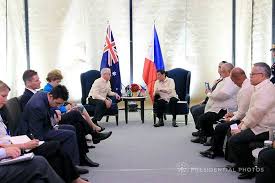
DESPITE the current economic turmoil, Australian firms have stayed put in the Philippines and more are expected to expand their business locally.
Christopher Lim, Senior Trade and Investment Commissioner at the Australian Embassy, is upbeat on the prospects of Australian firms expressing interest in doing business in the Philippines.
“The Australian business community here has been unwavering in its commitment to the Philippines. As far as I know, no Australian business packed up and left,” Lim said during a recent virtual event.
Currently, over 300 Australian companies employ about 44,000 Filipinos in mining, shipbuilding, energy supply, retail trade, accommodation and food service facilities, manufacturing, transportation and storage. At least 200 of these are in the information technology-business process management industry.
Lim even noted that “some Australian companies have done better” compared to previous years. “Furthermore, I receive a continuous stream of inquiries from new and existing Australian companies wanting to do more in the Philippines,” he said.
The senior trade official said Australian firms, like any other companies, had to adjust amid the lockdown restrictions imposed since last year as they pivoted to digitalization.
“I heard from several Australian businesses here in the Philippines that the pandemic has compelled them to innovate and accelerate the transformation towards digitalization,” he explained.
Despite the lockdown protocols, there has been no major concern raised by the Australian firms when it comes to the supply chain.
Australian Ambassador to the Philippines Steven J. Robinson explained that while accessibility of goods was a challenge during the onset of community quarantine, the Philippines was able to manage the situation.
Robinson said Australian goods were still able to hit the local markets for distribution.
“The supply chain worked as we have hoped for them to work,” he said.
Meanwhile, the ambassador vowed that the embassy would continue working with the local governments and women-led small- and medium-sized enterprises to prepare them from future “economic shocks.”
“For the Australia-Philippines trade relationship, there is much more that can be achieved in a manner that is commensurate with our respective economies as we emerge on the other side of the pandemic,” Lim added.
Lifting of mining ban
Robinson welcomed the recent lifting of the moratorium on processing new mining projects, saying it was a “really positive step forward” for the country.
Last month, President Duterte signed Executive Order (EO) 130, which amended Section 4 of EO 79 on the Grant of Mineral Agreements Pending New Legislation. The new EO allows the Department of Environment and Natural Resources and the Mines and Geosciences Bureau (MGB) to process applications for new mining projects.
The Australian mining firms, Robinson said, are “already thinking about what…the future holds for them as result of the ban…being lifted.”
The ambassador added he is “very optimistic” about the future of Australian mining here in the Philippines.
“The Philippines is a natural resource rich country and there is much that could be done here that would really benefit the Philippines recovery,” Robinson said.
MGB said last month at least 100 new mining projects were pending for approval, which can generate P21 billion in revenues and a minimum of 42,000 new jobs.
Market access
Australia is also looking forward to finishing the discussions soon on the Philippines’s market access request for its banana exports.
“Where that currently stands is the Philippines and Australia are working to provide an exchange of information between us about various standards and processes,” Robinson said. “We are hopeful of moving all of these discussions towards a positive conclusion as soon as possible.”
The yellow fruit is considered a major agriculture export product for the Philippines.
Last year, banana exports reached 3.595 million metric tons (MT), which is 18.35 percent lower than 4.403 million MT in 2019, according to the Philippine Statistics Authority (PSA).
Revenues from banana exports fell by 20.6 percent to $1.552 billion last year from $1.953 billion.
The Department of Trade and Industry earlier said they were also seeking market access for dragon fruit and durian from Australia.
According to PSA, the country’s exports to Australia fell by 10.3 percent to $356.94 million in 2020 from $398.10 million year-on-year. Imports from Australia reached $766.42 million last year, which is 45.7 percent lower than $1.41 billion in 2019.
Read full article on BusinessMirror
